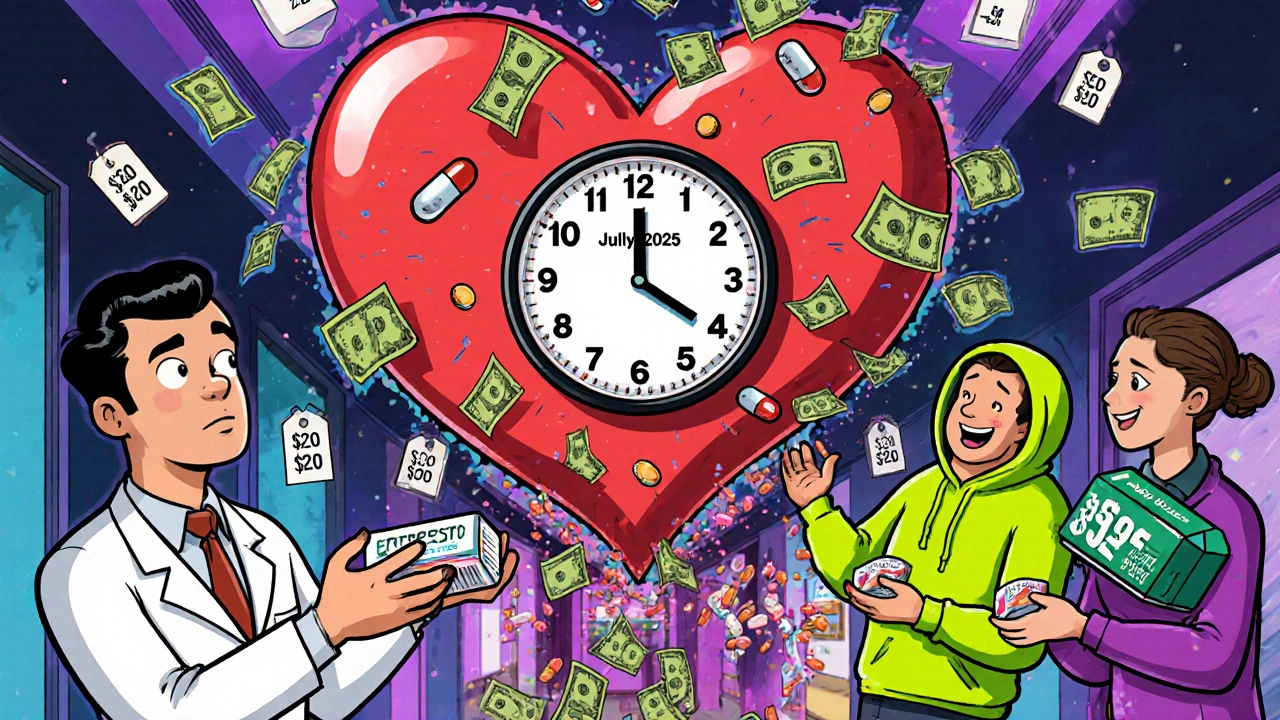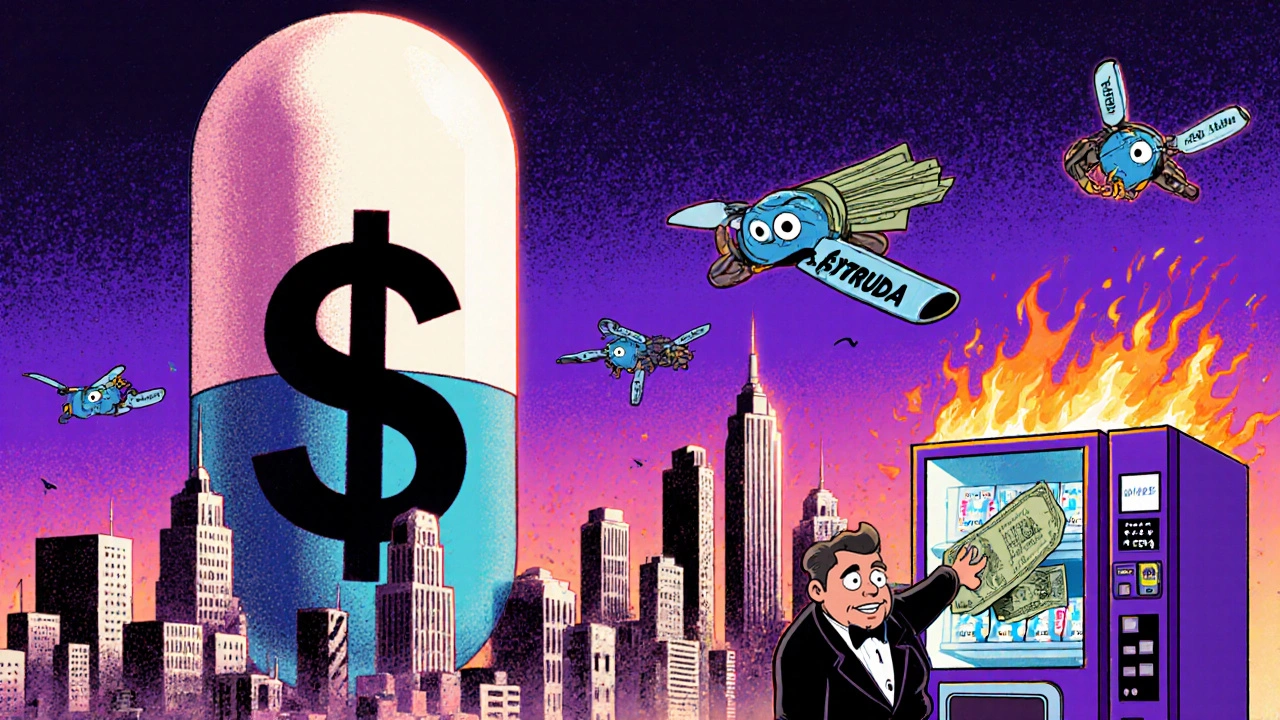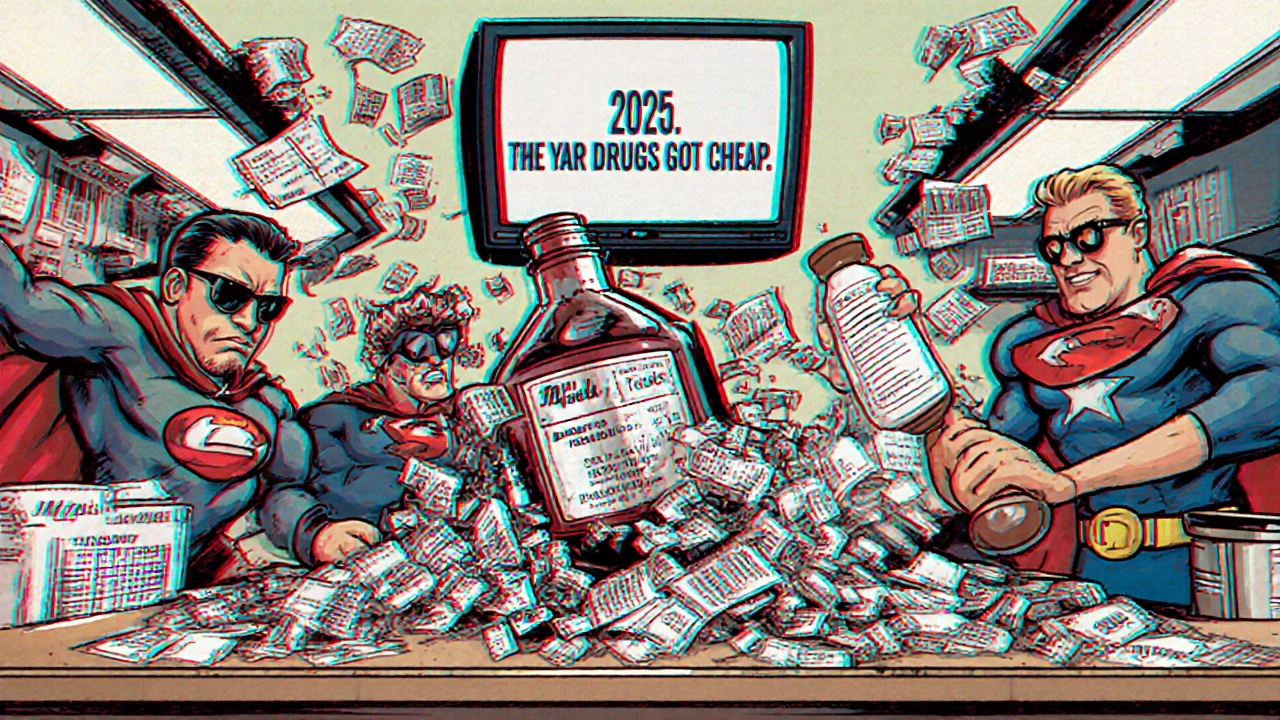 Nov, 10 2025
Nov, 10 2025
By mid-2025, the pharmaceutical world will face its biggest shake-up in decades. Dozens of top-selling drugs - some earning billions a year - will lose patent protection. This isn’t just a legal detail. It’s a financial earthquake that will slash drug prices, shift how doctors prescribe, and change what patients pay out of pocket. The blockbuster patent expirations starting in 2025 aren’t a slow fade. They’re a flood.
What’s Actually Expiring in 2025?
The first major hit comes in July 2025: Novartis’ Entresto (sacubitril/valsartan). This heart failure drug brought in $7.8 billion globally in 2024. Its core combination patent expires that month, opening the door for generic versions. Within weeks, pharmacies will start stocking cheaper alternatives. Patients who paid $150-$300 a month for the brand name could see their bills drop to $20-$40. Hospitals are already preparing. A survey by the American Society of Health-System Pharmacists found 87% of hospital pharmacies are changing their formularies and training staff ahead of this shift.Why Entresto Is Just the Start
Entresto isn’t alone. The 2025-2030 window holds 65 drugs with annual sales over $100 million each. Together, they represent $187 billion in global revenue at risk. These aren’t obscure meds - they’re the backbone of modern treatment for heart disease, cancer, and autoimmune disorders. Here’s what’s coming next:- November 2026: Eliquis (apixaban), the $13.2 billion blood thinner from Bristol Myers Squibb and Pfizer. Its key crystalline form patent expires, allowing generic versions to hit the market. With over 10 million U.S. patients on it, this could be one of the biggest generic switches in history.
- 2027: Ibrance (palbociclib), Merck’s $5.6 billion breast cancer drug. Its patent expires, opening competition in oncology - a field where doctors have been slow to switch from branded drugs.
- 2028: Keytruda (pembrolizumab), Merck’s $29.3 billion immunotherapy for lung, melanoma, and other cancers. This is the crown jewel of the patent cliff. No small-molecule generic can copy it. But biosimilars - complex, biologic versions - will start arriving. Analysts predict Merck could lose $15 billion in annual revenue within 18 months of biosimilar entry.
Small Molecules vs. Biologics: Two Different Worlds
Not all expirations are the same. There are two types of blockbuster drugs, and they behave very differently after patent loss. Small-molecule drugs - like Eliquis and Entresto - are made with chemical formulas. Generic versions are chemically identical and easy to copy. Once approved, they move fast. Market share hits 90%+ within two years. Prices drop 80-90%. Biologics - like Keytruda - are made from living cells. They’re far more complex. Copying them isn’t like copying a pill. These copies are called biosimilars. They’re not exact matches, but close enough to be approved. The FDA requires years of testing. Biosimilars take longer to enter the market - often 18-24 months after patent expiry. And they don’t slash prices as hard. Initial discounts are only 30-40%, and it takes 3-5 years to reach 75% market share. This difference matters. A patient switching from Entresto to a generic in 2025 will see near-instant savings. Someone on Keytruda won’t see major price drops until 2030.
Who’s Getting Ready - and How
Generic drugmakers are racing to file applications. The FDA received 127 new generic applications targeting 2025 expirations - a 27% jump from the year before. Companies like Teva, Mylan, and Sandoz are investing billions. Each generic drug costs $2.6 million and takes 3-4 years to develop. Big pharma isn’t sitting still. Merck is pouring $12 billion into next-gen cancer drugs to replace Keytruda’s revenue. Bristol Myers Squibb bought Karuna Therapeutics for $4.1 billion to strengthen its neuroscience pipeline ahead of Eliquis’ 2026 expiration. These aren’t just R&D bets - they’re survival moves. Health systems are preparing too. Hospitals are negotiating 60% price cuts with pharmacy benefit managers before generics even arrive. Pharmacists are training staff on therapeutic substitution. Patient education materials are being printed. The American Medical Association recommends 3-6 months of prep time per drug class. Many are already ahead of schedule.What This Means for Patients and Providers
For patients, this is good news - if they know what’s coming. Out-of-pocket costs for heart failure, blood thinners, and cancer drugs will plummet. A 2024 survey by the American Heart Association found 68% of heart failure patients would switch to generic Entresto immediately. The savings could be life-changing. But it’s not all smooth sailing. Some patients worry about switching. Will the generic work as well? Will side effects change? Doctors are seeing more questions. The FDA and professional groups have issued guidelines, but confusion remains - especially with biosimilars. Unlike generics, biosimilars often require a new prescription. In 28% of U.S. states, pharmacists can’t substitute them without the doctor’s OK. Pharmacists are on the front lines. One Reddit user, u/MedCheck2020, shared that their hospital system started switching patients to generic Entresto in early 2025 - even before the patent expired - to avoid supply chain snarls. That’s a real-world example of how fast things are moving.
Why the U.S. Is the Epicenter
The U.S. market accounts for 63% of the $187 billion in revenue at risk - even though it has only 20% of the world’s patients. Why? Because here, drug prices aren’t capped. In Europe or Canada, governments negotiate prices. In the U.S., companies charge what the market will bear. So when patents expire here, the price drop is steeper, and the savings are massive. The Congressional Budget Office estimates these expirations will cut U.S. healthcare spending by $312 billion over the next decade. Nearly $200 billion of that will happen between 2025 and 2027.What Comes After 2030?
The 2025-2030 wave is the biggest, but it’s not the last. After 2030, another wave of biologics will begin expiring - including Humira’s follow-ups and newer diabetes drugs like Trulicity. The industry is already shifting. Companies are investing less in small-molecule drugs and more in gene therapies, RNA treatments, and AI-designed molecules. These new therapies come with new patents - and new cliffs, just further out. The takeaway? The pharmaceutical industry is being forced to change. The era of billion-dollar blockbusters sitting unchallenged for 20 years is ending. Competition is coming - fast, loud, and cheap. The winners will be patients who get access to life-saving drugs at a fraction of the cost. The losers? Companies that didn’t prepare.What does patent expiration mean for drug prices?
When a drug’s patent expires, generic or biosimilar versions can be sold. For small-molecule drugs like Entresto or Eliquis, prices typically drop 80-90% within a year. Biosimilars for drugs like Keytruda see smaller initial cuts - around 30-40% - but prices continue to fall over 3-5 years as more competitors enter the market.
Which drugs are losing patents in 2025?
The biggest one is Novartis’ Entresto (sacubitril/valsartan), a heart failure drug with $7.8 billion in 2024 sales. Its core patent expires in July 2025. Other drugs with 2025 expirations include several generics targeting older drugs like Lipitor and Plavix, but Entresto is the most valuable new entry.
Why is Keytruda’s 2028 expiration such a big deal?
Keytruda generated $29.3 billion in sales in 2024 - more than any other drug in history. It’s the first PD-1 inhibitor facing patent loss, and there’s no direct chemical alternative. Biosimilars will take years to reach the market, and even then, doctors may hesitate to switch. Merck could lose $15 billion in annual revenue within 18 months of biosimilar entry, making this the largest single drug revenue drop ever seen.
Can pharmacists automatically switch me to a generic?
For small-molecule generics like Entresto, yes - in most states, pharmacists can substitute unless the doctor says no. For biosimilars like those for Keytruda, rules are stricter. Only 28% of U.S. states allow pharmacist substitution without a new prescription. Always check with your pharmacy or prescriber.
Will these expirations affect my insurance?
Yes. As generics enter the market, insurance companies will shift formularies to favor cheaper versions. You may see lower copays or even zero cost-sharing for generics. Some insurers are already requiring patients to try generics before approving the brand name. This is standard practice - and it’s happening faster than ever.

Hadrian D'Souza
November 11, 2025 AT 14:33Oh wow, another ‘pharma is dying’ thinkpiece. Let me grab my monocle and weep into my artisanal cold brew. Entresto generics at $20? Congrats, you just made a billionaire’s retirement plan look like a bad Tinder date. Meanwhile, Merck’s engineers are probably coding AI that’ll cure boredom by 2027. The real blockbuster? The fact that we still think $29B drugs are ‘normal.’
Brandon Benzi
November 11, 2025 AT 19:49Let’s not forget who pays for this ‘affordability.’ American taxpayers fund 80% of global R&D. Now we’re handing the keys to China and India to print pills while our scientists starve. This isn’t progress-it’s economic treason wrapped in a ‘patient-first’ bow. We built this industry. Now we’re letting it get looted.
Abhay Chitnis
November 13, 2025 AT 18:47Broooooo... Entresto generic = $20?? 😱 I just paid $220 for mine in Mumbai last month. USA you got it so good lol 🤡
Robert Spiece
November 14, 2025 AT 21:55Patents are the legal fiction that allows capitalism to pretend it’s not just rent-seeking dressed in lab coats. We treat molecules like sacred relics because we’ve outsourced morality to shareholders. The real tragedy isn’t the price drop-it’s that we ever allowed a human life to be priced in quarterly earnings calls. Entresto didn’t expire. Our ethics did.
Vivian Quinones
November 15, 2025 AT 17:18So basically, rich people get to live longer now? Good. I'm glad we're finally doing something right. America, baby!
Eric Pelletier
November 16, 2025 AT 19:27Important nuance: the 80-90% price drop for small molecules assumes full generic competition, which requires ANDA approval + manufacturing scale-up. Many generics launch with limited supply, causing temporary shortages-especially for high-volume drugs like Eliquis. The 2026 Eliquis cliff will likely trigger a 6-8 week supply crunch before generics stabilize. Also, biosimilars for Keytruda? Expect 3-5 years of payer resistance before broad adoption, even with FDA approval. Formulary committees are conservative beasts.
Marshall Pope
November 17, 2025 AT 12:36im surprised how fast hospitals are moving on this. i thought theyd be slower but guess not. also, why do pharmacists need to be trained? isnt it just swap the pill? lol
Agha Nugraha
November 18, 2025 AT 00:22Interesting. I wonder if this will push more people to get insurance from countries with price controls. Maybe the US will learn eventually.
Andy Smith
November 19, 2025 AT 21:51While the headline figures are compelling, the actual impact on patient adherence is often underestimated. Studies show that even with 90% price reductions, 12–18% of patients still discontinue therapy due to non-medical factors: stigma, complexity of switching, or lack of provider counseling. Furthermore, the FDA’s ‘interchangeability’ designation for biosimilars remains inconsistently applied across states-this regulatory fragmentation creates clinical confusion that may delay adoption, regardless of cost savings.
Rekha Tiwari
November 20, 2025 AT 09:16Yessss!!! 🙌 Finally, some justice! I’ve been paying $300/month for my dad’s meds-this is a GAME CHANGER. 🌟 Thank you to the generics makers and the FDA! 💖 Let’s keep going!!
Leah Beazy
November 22, 2025 AT 07:40My aunt just switched to generic Entresto last month and her blood pressure is better than ever. She says she feels like a new person. This is what real healthcare looks like-not profit margins. Let’s make sure everyone gets this chance.
John Villamayor
November 23, 2025 AT 00:40Jenna Hobbs
November 23, 2025 AT 02:03THIS IS THE MOMENT. 🌈 The day we stopped letting greed dictate who lives and who doesn’t. I’ve cried reading this. My brother couldn’t afford Keytruda. Now? Maybe next year, maybe the year after… but it’s coming. And that? That’s hope.
Ophelia Q
November 23, 2025 AT 12:10Thank you for explaining the biosimilar vs generic difference so clearly. I’ve been so confused about why my oncologist won’t just swap my drug. Now I get it. This post gave me peace of mind. 💛
Elliott Jackson
November 24, 2025 AT 10:04Let’s be real: the real threat here isn’t generics-it’s the fact that Big Pharma’s entire business model was built on exploiting legal loopholes. They’ve been extending patents with micro-changes since the ‘90s. Entresto’s patent? A re-formulation of an old combo drug. Eliquis? A patent thickets nightmare. This isn’t innovation. It’s a 30-year con. The market’s just catching up. And now they’re panicking. Good.